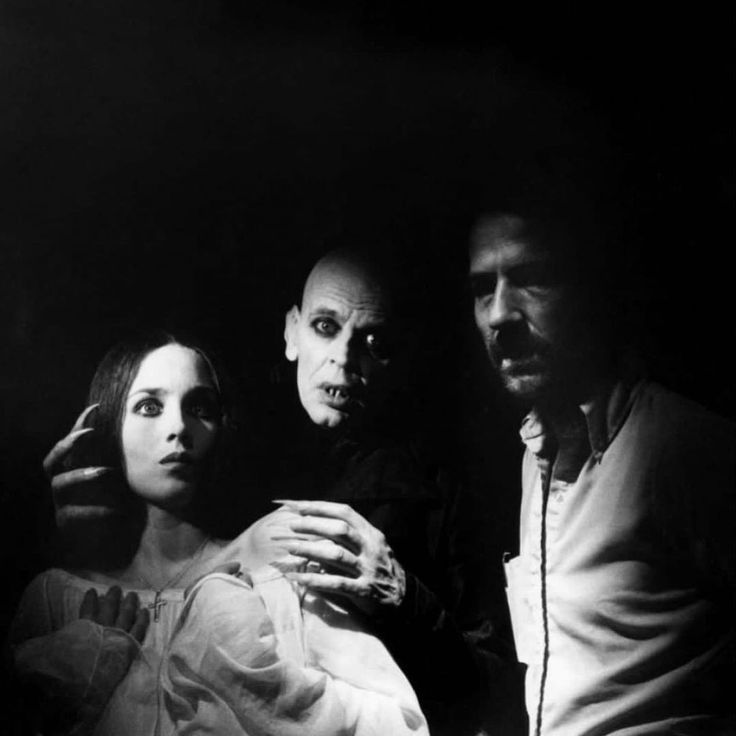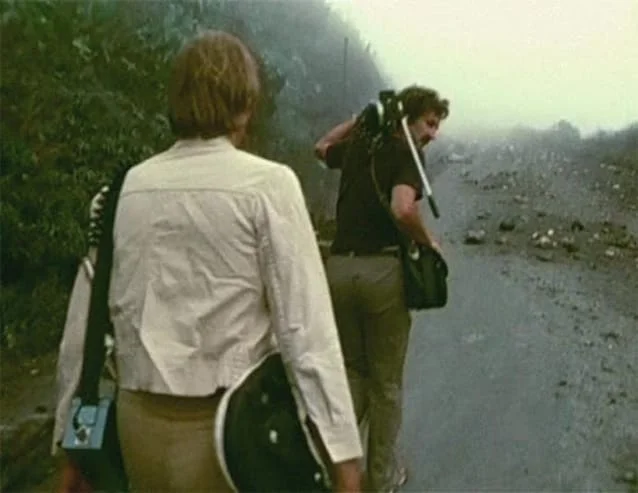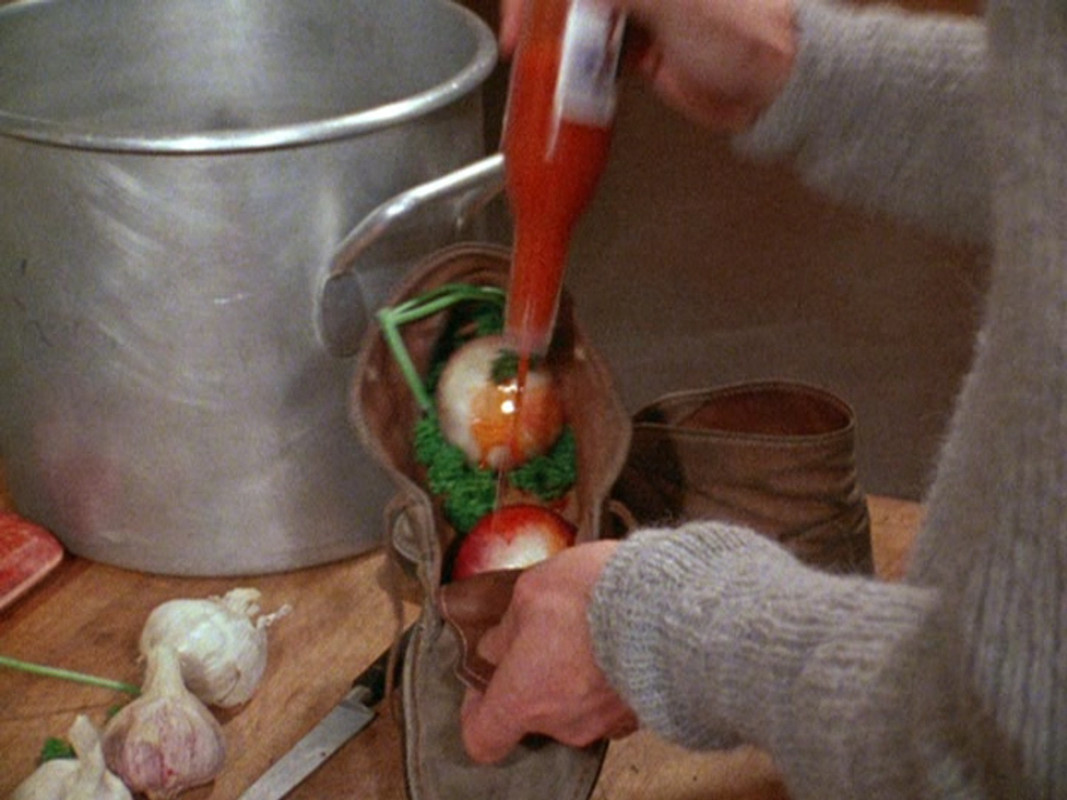“I never thought I could be friends with a German again. But here I am… Werner is somehow like Murnau brought back to life.” Nosferatu: Phantom der Nacht [Nosferatu the Vampyre] (Werner Herzog, 1979)
Oct
22
eternal returns

Adjani, Kinski, and Herzog on set. DP: Jörg Schmidt-Reitwein.
[A favourite] horror remake*
– Lotte Eisner visiting the set of Herzog's Nosferatu (via)
Coming back to Murnau's expressionist masterpiece was Herzog's bridge between the films made by the grandfathers of German cinema and his era. Herzog, born in 1942 Munich, noted this void created by that philistine regime and felt that, by picking up the thread cut a quarter of a century earlier, German culture could see a restoration to its (non-nationalistic) greatness. Thus a menagerie of rats and actors was released in a reluctant, bourgeois Dutch town.
But that's a story for another generation to draw upon.
* the Bales 2025 Film Challenge for October is horror-themed as opposed to date-based, and is all about favourites. Expect non-horror and films I believe to be relevant instead.
WernerHerzog
“Telephones were still working, we are told, and the air-conditioning and refrigerators in many houses were still on.” La Soufrière – Warten auf eine unausweichliche Katastrophe [La Soufrière: Waiting for an Inevitable Catastrophe] (Werner Herzog, 1977)
Jul
13

Herzog and crew make their way up the volcano (via). DPs: Edward Lachman & Jörg Schmidt-Reitwein.
Someone at a theme park or national park*
– narrator
The highest peak in the Parc national de la Guadeloupe is called La Grande Soufrière. The volcano had erupted before and was bound to do soon again. Hastily, the 76,000 islanders were evacuated with one farmer staying put. For Herzog reason to halt the editing of Herz aus Glas and make his way to the island.
* the Bales 2025 Film Challenge for July is, for unknown reasons, mostly not date-related and follows some sort of vacation narrative.
“I am the great traitor. There must be no other. Anyone who even thinks about deserting this mission will be cut up into 198 pieces. Those pieces will be stamped on until what is left can be used only to paint walls. Whoever takes one grain of corn or one drop of water… more than his ration, will be locked up for 155 years. If I, Aguirre, want the birds to drop dead from the trees… then the birds will drop dead from the trees. I am the wrath of God. The earth I pass will see me and tremble. But whoever follows me and the river, will win untold riches. But whoever deserts…””Aguirre, der Zorn Gottes [Aguirre, the Wrath of God] (Werner Herzog, 1972)
Jun
20
World Productivity Day

Don Lope de Aguirre (Kinski), his eyes focussed. DP: Thomas Mauch.
A character who is always on the GO [sic] for World Productivity Day
– Don Lope de Aguirre
Conquistador Don Lope de Aguirre drives his men deep into the Peruvian jungle, to El Dorado
Die große Ekstase des Bildschnitzers Steiner [The Great Ecstasy of Woodcarver Steiner] (Werner Herzog, 1974)
Mar
13

Walter Steiner, flying. DP: Jörg Schmidt-Reitwein.
Die große Ekstase des Bildschnitzers Steiner [The Great Ecstasy of Woodcarver Steiner] (Werner Herzog, 1974)
Jan
25
Chamonix 1924 Winter Olympics

Live footage of Steiner preparing for his flight. DP: Jörg Schmidt-Reitwein.
Winter sports in celebration of the Chamonix 1924 Winter Olympics.
– Walter Steiner
In a film that is as much about Herzog as it is about Steiner, we follow the soft-spoken woodcarver in preparation of his definitive ski flight in Planica, Yugoslavia.
“When we behave nobody cares. But when we are bad nobody forgets.”Auch Zwerge haben klein angefangen [Even Dwarfs Started Small] (Werner Herzog, 1970)
Dec
30
National Short Person Day

Some of the main cast members, with three women in focus. They're outdoors and several animals, including a kneeling dromedary, can be spotted in the background. DP: Thomas Mauch.
A short main character for National Short Person Day (USA).
– Hombré
“I look into the distance to the end of the world. Before the day is over, the end will come. First, time will tumble, and then the earth. The clouds will begin to race… the earth boils over; this is the sign. This is the beginning of the end. The world's edge begins to crumble… everything starts to collapse… tumbles, fall, crumbles and collapses. I look into the cataract. I feel an undertow, it draws me, it sucks me down. I began to fal, a vertigo seizes upon me.”Herz aus Glas [Heart of Glass] (Werner Herzog, 1976)
Mar
13
tea

A young maid (Sonja Skiba) holding a heavy tray with cups, plates, and various tea-related pottery. There's a somnambulist quality to her bearing. DP: Jörg Schmidt-Reitwein.
– Hias
“Can you smell the garlic?”Garlic Is as Good as Ten Mothers (Les Blank, 1980)
Dec
12
National 12 Hour Fresh Breath Day

Three representatives of the garlic festival. Their tees read: THE GARLIC TO SHARE WITH A FRIEND, MINE DOESN'T STINK, and WE LEAVE YOU BREATHLESS. DP: Les Blank.
Someone has bad breath on National 12-hour Fresh Breath Day (USA)
“When he shows the 1978 film Always for Pleasure, about the food, music and indigenous culture of New Orleans, [Les Blank] has been known to whip up a pot of red beans and rice in the back of the theatre. [cont. below]
– Alice Waters. During screenings, the audience would reply with “YES!”
“At presentations […] Blank can occasionally be spied tossing several heads of garlic into a toaster oven so that the aroma wafts over the audience at just the right mouth-watering moment.” (via)
Werner Herzog Eats His Shoe (Les Blank, 1980)
Nov
8
Cook Something Bold Day

Herzog prepares his left suede Clarks in Alice Waters' restaurant kitchen. DP: Les Blank.
“Was ist loos? Der Hund is loose.” Stroszek (Werner Herzog, 1977)
Sep
9
German Language Day

A warm Railroad Flats, Wis. “Willcomen” [sic] for (LtR) Scheitz, Eva, and Bruno, with Mr Scheitz's nephew (Clayton Szalpinski) squeezed between his “Onkellein” and Eva. DP: Thomas Mauch.
Bruno Stroszek (Bruno S.), his friends Eva (Eva Mattes) and Scheitz (Clemens Scheitz, responsible for the fairy-tale music you hear in this film) decide to leave dreary #Berlin behind and move to #Wisconsin where the latter's nephew lives. A new life, with dreams of music and animal magnetism, awaits them there.
– Clayton
As so oft with #Herzog, the story behind Stroszek is as engrossing as the resulting film. Documentary maker Errol Morris and Herzog were fascinated by Wisconsin's own Ed Gein and wondered if Gein had dug up his own mother, as was rumoured at the time. As they would, they decided to open the poor woman's grave. Morris never showed up, and neither did Herzog but only because his car broke down en route to Plainfield, Wisconsin. Trying to get the vehicle fixed, Herzog entered the workshop of a Clayton Szalpinski.
A character in his own right, and a non-actor to boot, Clayton ended up in Stroszek as Scheitz's nephew; a MacGuffin odder than a dancing chicken.